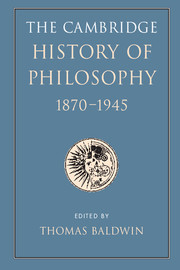Book contents
- Frontmatter
- Contents
- List of contributors
- Introduction
- I 1870–1914
- 1 Positivism, Idealism, and Pragmatism
- 2 Psychology and Philosophy
- 7 Psychology: old and new
- 8 The unconscious mind
- 3 Logic, mathematics, and judgement
- 4 Philosophy and the new physics
- 5 The idea of social science
- 6 Ethics, politics, and legal theory
- 7 Philosophy of religion and art
- Interlude
- II 1914–1945
- Biobibliographical appendix
- Bibliography
- INDEX
- References
8 - The unconscious mind
from 2 - Psychology and Philosophy
Published online by Cambridge University Press: 28 March 2008
- Frontmatter
- Contents
- List of contributors
- Introduction
- I 1870–1914
- 1 Positivism, Idealism, and Pragmatism
- 2 Psychology and Philosophy
- 7 Psychology: old and new
- 8 The unconscious mind
- 3 Logic, mathematics, and judgement
- 4 Philosophy and the new physics
- 5 The idea of social science
- 6 Ethics, politics, and legal theory
- 7 Philosophy of religion and art
- Interlude
- II 1914–1945
- Biobibliographical appendix
- Bibliography
- INDEX
- References
Summary
INTRODUCTION
The concept of the unconscious is now associated so firmly with Sigmund Freud that an alternative conception of the unconscious, one which is not in some way dependent on or derived from that of psychoanalysis, is hard to imagine. Yet, as studies of the prehistory of psychoanalysis emphasise, by no means did Freud introduce the concept from scratch: already by 1900, when Die Traumdeutung (The Interpretation of Dreams) appeared, the unconscious was a well-established intellectual topic (the classic studies of psychoanalysis’s ancestry are Ellenberger 1970 and Whyte 1979; see also Brandell 1979: ch. 8, Decker 1977: ch. 9, and Ellenberger 1993: chs. 1–2; Freud’s debts are acknowledged in Jones 1953: I, 435–6). Throughout the period 1870 to 1914 the concept of the unconscious was, however, in comparison with its psychoanalytic version, indeterminate in several respects. This reflects its deep involvement with two broader issues in later nineteenth-century philosophy, namely the disentangling of psychology as an autonomous discipline from philosophy, and the opposition between ascendant materialistic naturalism and the contrary impulse to preserve something of the metaphysical systems which had dominated the first three decades of the century (for a different suggestion as to why the unconscious appeared in Western thought, see Foucault 1966 [1974: 326–7]).
- Type
- Chapter
- Information
- The Cambridge History of Philosophy 1870–1945 , pp. 107 - 116Publisher: Cambridge University PressPrint publication year: 2003
References
- 2
- Cited by



